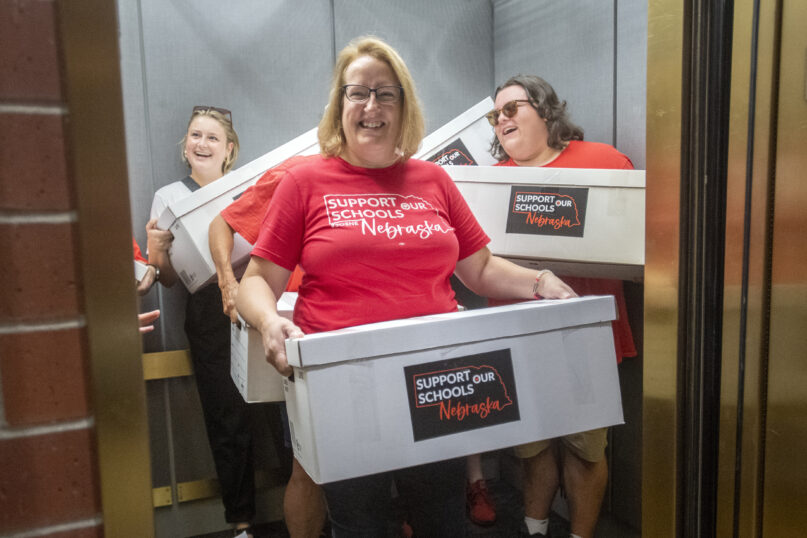OMAHA, Neb. (AP) — Activists declared a victory this week in their fight to repeal a new Republican-backed law allowing Nebraska taxpayer money to be used for private school tuition. But both sides acknowledge that the battle is just beginning.
If the law is repealed, Nebraska would join North Dakota as the only states not offering some type of public payment for private school tuition. Opponents said Wednesday that they’d gathered nearly twice the roughly 60,000 signatures needed to ask voters for repeal.
“If this initiative makes it onto the 2024 ballot, I can promise you the fight will not be over,” Gov. Jim Pillen said.
Both Nebraska and North Dakota passed bills earlier this year to fund some private school tuition. North Dakota’s bill set aside $10 million in taxpayer dollars for private school tuition reimbursement. The legislation was later vetoed by the governor.
The effort to protect Nebraska’s law has drawn conservative support nationally, including from the American Federation for Children, founded Betsy DeVos, former Trump administration education secretary. National groups are trying to make their mark on school policies following COVID-19 lockdowns and ongoing fights over transgender policies.
Nebraska’s law would allow businesses, individuals, estates and trusts to donate millions of dollars a year they owe collectively in state income tax to organizations funding private school tuition scholarships.
Support Our Schools, an organization sponsored and heavily funded by public education unions, began gathering signatures June 6 with a goal of collecting 90,000 in three months. By Wednesday’s deadline, the group turned in 117,000 signatures to the Secretary of State’s office, which will spend the next few weeks determining whether enough of them are valid for the question to make the ballot.
The higher-than-expected number of signatures is indicative of public sentiment against using taxpayer money for private schools, organizers said.
Supporters of the private school funding plan, including the state’s powerful Roman Catholic lobbying group, launched an aggressive effort to counter the petition drive, blanketing the state with ads urging people not to sign the petition. They also sent 11th-hour mailers with an affidavit that petition signers could use to get their names removed.
Faced with the likelihood that opponents have collected enough signatures to get the question on the ballot, supporters have pivoted to declare a victory of sorts, noting that petitioners failed to get the roughly 122,000 signatures needed to stop the law from taking effect on Jan 1.
“When the bill takes effect, we look forward to the first round of scholarships reaching children in need for the 2024-2025 school year,” said Tom Venzor, director of the Nebraska Catholic Conference, the state’s Catholic lobbying group that advocates for the church’s 110 private schools in the state.
“Our goal has always been to help as many kids as possible as quickly as possible, and we can do that now,” Keep Kids First Nebraska, the group started to counter Support Our Schools, said in a statement.
Opponents answered that optimism with a shrug, noting that companies and people are always free to make charitable contributions to private school tuition scholarship programs. But voters could repeal the scholarship law before 2025, when the law’s dollar-for-dollar tax credits would be claimed, said Karen Kilgarin with Support Our Schools.





